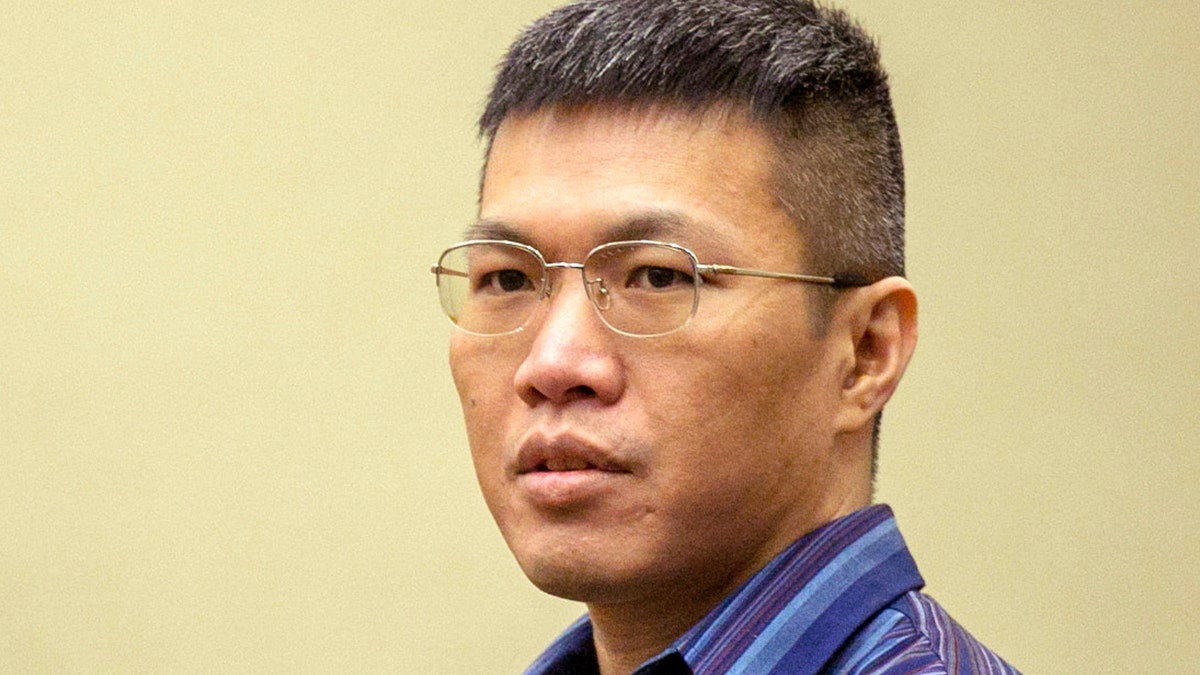
FILE - In this Aug. 31, 2013 file photo, defendant Johnathan Doody, is shown during his retrial in Phoenix. Closing arguments are set for Monday Jan. 13, 2014, in the trial of Doody, charged in the 1991 killings of nine people, including six monks, at a suburban Phoenix Buddhist temple. (AP Photo/The Arizona Republic, Michael Schennum, File) (The Associated Press)
PHOENIX – A man charged with killing nine people, including six monks, at a suburban Phoenix Buddhist temple in 1991 carefully planned the slayings and didn't miss a shot as he fired 17 rounds into the victims, most to the back of their heads, a prosecutor told jurors in closing arguments Monday.
Johnathan A. Doody was 17 when he was accused of participating in the slayings at the Wat Promkunaram temple.
He was found guilty in 1993 and sentenced to 281 years in prison. But an appeals court threw out his conviction in 2011 after ruling that investigators improperly obtained his confession.
Deliberations during his second trial were halted several times, including once when a juror was removed from the case after complaining it had become too emotional. The judge eventually declared a mistrial in October after the panel failed to reach a verdict.
Doody's third trial began Dec. 4. He has maintained his innocence.
"This was someone who planned out what was going to happen before he even stepped foot inside that temple," prosecutor Jason Kalish told jurors. "This is somebody going person to person and back again killing them, shooting them, making sure they were dead."
Allesandro "Alex" Garcia pleaded guilty in the case and was sentenced to life in prison in exchange for his testimony and a promise that prosecutors wouldn't seek the death penalty.
During the retrials, Garcia described for jurors how the crime was Doody's idea, aimed at stealing about $2,600 cash and valuables from the monks.
Garcia said he tried to persuade Doody not to kill the victims after the robbery, but Doody was determined to leave behind no witnesses.
Police eventually found the stolen items at Garcia's house, where Doody was staying at the time.
Doody's brother and mother were members of the temple, but neither were there the night of the shootings.
Defense attorneys say Garcia is lying and only implicated Doody to avoid a death sentence, pointing out for jurors how he initially implicated four other men from Tucson who were later found to have had nothing to do with the crime.
Prosecutors say both men are equally culpable.
Kalish explained to jurors that Garcia was only there at Doody's request, and he didn't even shoot any of the victims with a direct hit from his shotgun, describing the accomplice as disorganized. He said that's "opposed to the person (Doody) who fired 17 shots and hit 17 different times, not one miss, and almost every one of those shots to the back of the head."
Defense attorneys were set to present their closing arguments Monday afternoon.
In his confession, Doody said he went to the temple with Garcia but claimed he was outside when the shootings occurred. The appeals court's decision meant prosecutors couldn't use Doody's confession at his retrials. They instead relied largely on Garcia's testimony.
Doody was spared the death penalty in his first trial.
Prosecutors couldn't seek the death penalty in Doody's retrials because of a 2005 U.S. Supreme Court decision that prohibits authorities from pursuing that punishment against defendants who were younger than 18 years old when the crime occurred.

